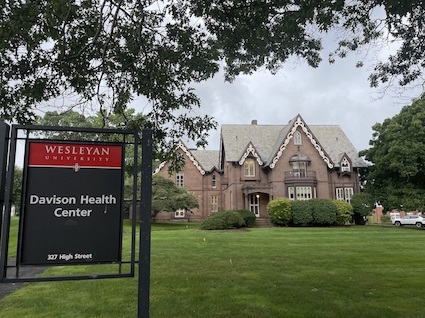
The University has issued new COVID-19 guidelines for the 2024–25 school year, further easing rules as the risk of serious illness continues to fall. Despite this relaxation, the Davison Health Center still recommends precautionary measures such as masking, thorough handwashing, and healthy coughing and sneezing habits to lower the spread of infections. The University also is monitoring and taking preventative measures towards other diseases such as the flu.
Since Thursday, Aug. 1, those who test positive for COVID-19 are no longer required to quarantine if they are feeling well and have had no fever for 24 hours. Those who are experiencing symptoms must isolate until they meet those requirements. Regardless, both groups must follow precautionary measures, including masking for 10 days after exhibiting symptoms or testing positive. In addition, students no longer have to report their positive test result to the Davison Health Center.
The new policy follows current CDC guidelines and is subject to change.
The Davison Health Center will also stop issuing sick notes to students who have COVID-19. It will now be treated as any other viral illness, meaning students are responsible for contacting their professors to inform them of medical absences. Students can consult the Davison Health Center’s Medical Excuse Policy page for more information.
On campus, there were fewer cases of COVID-19 in the 2023–24 school year than previous years. However, Medical Director Tom McLarney believes this may have been due to reduced testing and reporting of positive cases by students.
“This trend was noted in communities across the country,” McLarney wrote in an email to The Argus. “Covid activity will fluctuate throughout the year[;] this is expected. The concerning issues will be the emergence of a virulent strain that can result in serious illness.”
However, new variants have been shown to be generally less severe.
“Fortunately, Covid is not what it was 2 years ago,” McLarney wrote. “Cases are mild, probably due to evolving strains causing much milder disease and most of the population having immunity due to vaccination, natural disease or both. But, just like influenza, we still need to take Covid seriously and practice preventive measures.”
The University continues to provide free COVID-19 tests to students. They are available at Davison Health Center during operating hours and at the Public Safety Office after hours and on weekends. However, the supply is set to expire on Thursday, Dec. 5.
“Most NESCAC schools are not providing Covid tests,” McLarney wrote. “A decision will be made as to what Wesleyan will do.”
As fall and winter approach, flu cases will also begin to rise. Flu vaccine clinics for students are scheduled to be held in Usdan University Center from Tuesday, Oct. 15 through Thursday, Oct. 17. Those intending on getting their flu shot at a pharmacy are recommended to get them in October in order to get protection through the flu season.
“First and foremost, get your flu vaccine,” McLarney wrote. “Although this vaccine is not mandated this year, it is strongly recommended.”
Although the vaccine can cause aches, it does not cause the flu. There is also no allergy cross over, including for egg allergies, as commonly believed. While those vaccinated can still catch the viral infection, the likelihood of contraction is lowered and, if contracted, symptoms will be milder.
Some other diseases less likely to affect the University are also being monitored. Mpox (formerly known as monkeypox) cases recently surged in the Democratic Republic of the Congo and surrounding countries, leading the World Health Organization to declare it a public health emergency of international concern. Several cases have been reported in Connecticut this year.
“We are living in a time where international travel is relatively easy which can accelerate the spread of infectious disease,” McLarney wrote. “Mpox can potentially affect us. Preventative vaccination is one of the best protections against infectious disease. The Davison Health Center is working closely with the Middletown Department of Public Health to provide the M-pox vaccine (a series of two) to those who are considered high risk.”
In addition, McLarney warned about mosquito-borne illnesses.
“Sporadic cases of both West Nile Virus and Eastern Equine Encephalitis are being identified,” McLarney wrote. “To date there have been no mosquitos testing positive for either of these illnesses in Middletown but that can change rapidly. There are no vaccines for these and prevention [is] our best ally.”
Some preventative measures against mosquito-borne illnesses include wearing shoes, socks, and tightly-woven, lightly-colored clothes to protect the skin, using mosquito netting and screens on windows and doors, using repellent, and emptying out stagnant water after rain storms.
“As a health care provider, I will stay up to date on the current state of not only Covid, but flu, M-pox, mosquito borne illnesses, food borne illness and how they affect our campus community,” McLarney wrote.
Spencer Landers can be reached at sklanders@wesleyan.edu.

